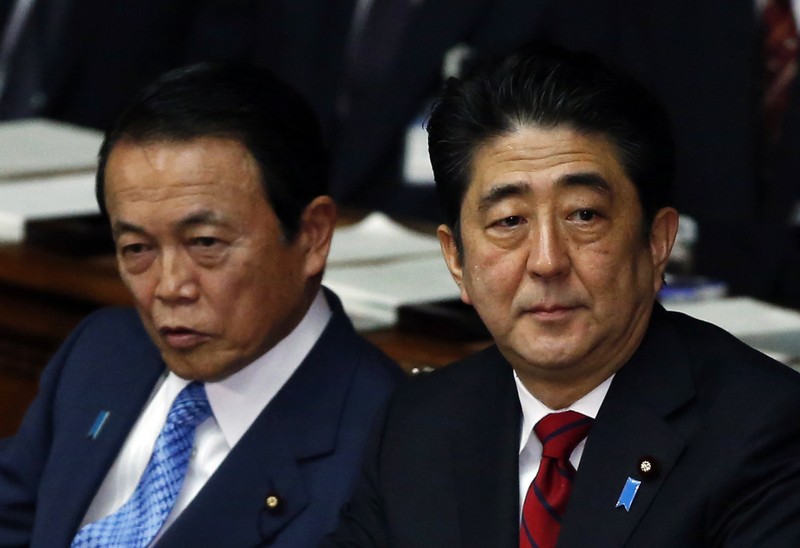
Japan’s Prime Minister Shinzo Abe (R) and Japan’s Deputy Prime Minister and Finance Minister Taro Aso sit at the lower house of the parliament in Tokyo January 24, 2014. REUTERS/Yuya Shino/File Photo
September 7, 2018
By Tetsushi Kajimoto and Takaya Yamaguchi
TOKYO (Reuters) – Japan would consider the need for an extra budget in the current fiscal year to support areas devastated by a recent chain of natural disasters, Finance Minister Taro Aso said on Friday, which could complicate efforts to restore tattered public finances.
“We will respond appropriately by examining the full picture of damages from a recent series of disasters and how the budget has been used,” Aso told reporters after a cabinet meeting.
Aso’s comment comes as a powerful quake struck the northern island of Hokkaido on Thursday, the second disaster to hit Japan this week after a summer in which the country has been battered by deadly typhoons, flooding and a record heat wave.
The minister made no mention of the size of the extra spending.
Kyodo news agency reported that a supplementary budget could exceed 1 trillion yen ($9.05 billion) including subsidies for local governments, the cost of reinforcing levees and other infrastructure as well as support for small firms and farmers
The spectre of bigger spending raises worries about Japan’s public debt – the industrial world’s heaviest at more than double the size of its economy, although the Bank of Japan’s massive debt purchases have helped lower borrowing costs.
Already, budget requests from Japan’s government offices have hit a record 102.7658 trillion yen for the next fiscal year starting in April, a government official with direct knowledge of the matter told Reuters.
The spending requests increased sharply due to bulging welfare costs to support the ageing population and rising military outlay in the face of threats from North Korea and China, said the official, who spoke on condition of anonymity as the figures will be finalised only later on Friday.
The finance ministry will scrutinise the budget requests and trim the size of spending in December when it drafts an annual budget for fiscal 2019.
The government plans stimulus measures to ease the pain from a planned sales tax hike in Oct. 2019. That would come on top of the budget requests, making it likely that the size of the fiscal 2019 initial budget will exceed 100 trillion yen for the first time ever, analysts say.
The initial budget for the current fiscal year amounts to 97.71 trillion yen, with social security and debt-servicing accounting for more than half the overall spending plan.
The government plans to raise the nationwide sales tax to 10 percent from 8 percent in October 2019 to pay for the cost of social welfare in a step towards Japan’s elusive budget balancing goal in fiscal 2025.
(Reporting by Takaya Yamaguchi and Tetsushi Kajimoto; Editing by Shri Navaratnam)

